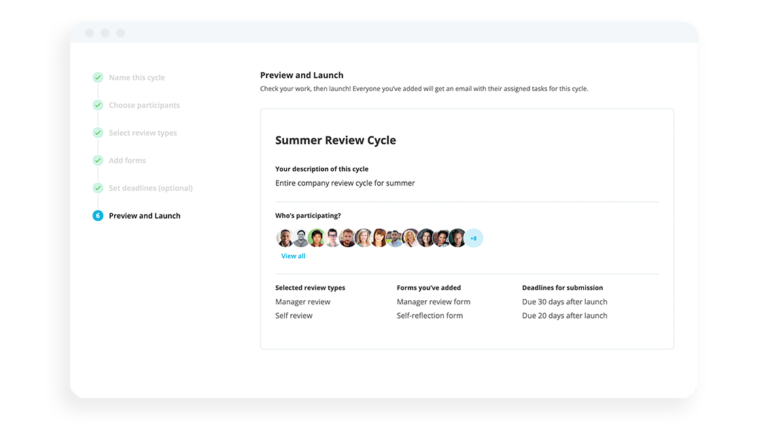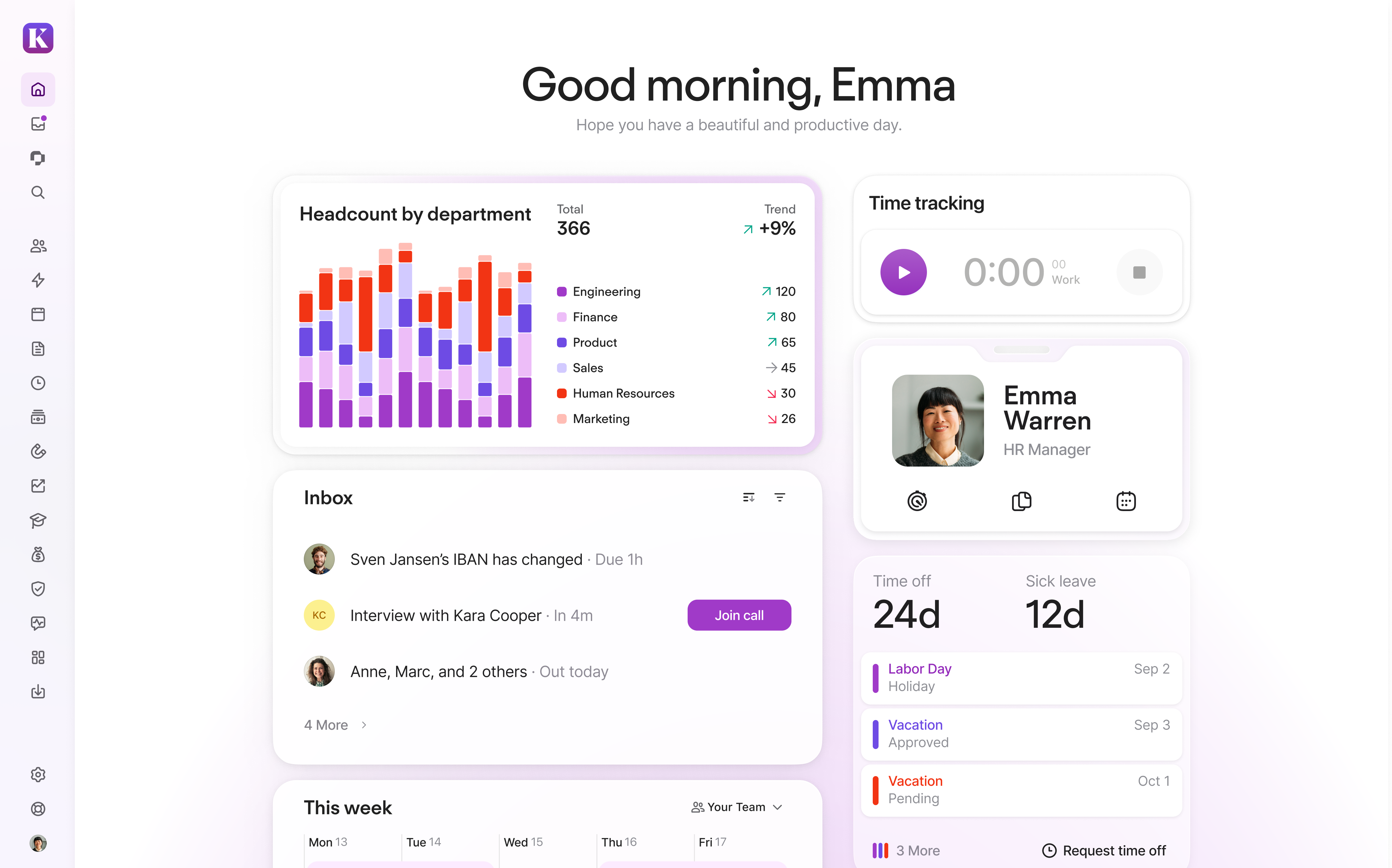How to identify, develop and retain your high potential (HIPO) employees

How many HIPO employees do you have? Every organisation has employees who stand out from the pack. Some are extremely efficient. Others are gifted at collaboration. Some have technical abilities that place them head and shoulders above other employees.
As valuable as these people are to your organisation, not all of them can be classified as ‘high potential’ or ‘HIPO’ employees. In this article, we’ll explore what HIPO employees are, and how you can recognise, develop and retain them starting today.
Start from the top with our performance review template today.Contents
- 1What Is a HiPo (High Potential) employee?
- 2Characteristics of High Potential Employees
- 3How to Identify High Potential Employees
- 4Three strategies to develop your HIPO employees
- 5Building a HiPo Employee Programme
- 6Benefits of Nurturing High Potential Employees
- 7Drive and track employee performance with Personio
What Is a HiPo (High Potential) employee?
A high potential (HIPO) employee definition is someone with the drive, ability and motivation to rise to a senior level within a company and succeed once they get there. HIPO employees achieve results in their current roles and show a hunger for more responsibility. They are quick thinkers who are able to take initiative and possess the soft skills that make them well-suited to join the next generation of leaders.
Characteristics of High Potential Employees
Exactly how a HIPO employee is defined may be different in each organisation, but there are certain characteristics that they generally share. A study from the Harvard Business Review identified three key markers of high potential employees for employers to look out for:
Ability: HIPO employees have the skills, knowledge and competencies needed for a leadership role, or the ability to develop them. They have a high IQ and can easily pick up new knowledge and apply it to their work. They show vision, creativity and imagination.
Social skills: High potential employees also have the social skills needed to manage both themselves and others. This includes the ability to handle pressure and deal with adversity. They conduct themselves with dignity and integrity and are able to develop and maintain positive, constructive relationships with their colleagues.
Drive: HIPO employees have the necessary work ethic, motivation and ambition to excel in their roles and move up the corporate ladder. They may be willing to deal with personal hardship in order to advance their career.
High potential vs. high performance: what’s the difference?
A high potential employee is by definition a high performer, but not all high performers are high potential employees. People can be very good at their jobs, but not have the leadership skills, motivation or mindset needed to move up.
Companies often mistake high-performance employees for high-potential employees, which can be a costly mistake. Even when someone is excellent at their job, they don’t necessarily have the very different capabilities needed to lead a team.
For example, a top performer in a company’s sales department might not have the necessary skills to motivate and manage a sales team. If they were promoted to a management role, they may struggle despite their strong performance as a salesperson.
How to Identify High Potential Employees
Identifying the people in your organisation who have high leadership potential can be beneficial to both parties. From the employer’s perspective, you’ll be able to focus on developing your HIPO employees so that they’re ready to take on a leadership role when the time comes.
And the employees themselves will be able to see that their unique skills and drive are valued by their employer, which can help with retention.
Here are some of the key characteristics to look for when identifying talent with high potential for growth:
They’re keen to take on leadership opportunities: A HIPO employee will jump at the chance to take on a leadership role such as managing a project, even when this is outside of their usual duties.
They’re invested in the company’s values and future: HIPO employees don’t just work for their paycheque: they’re strongly invested in the company’s mission and want to see it succeed.
They perform well under pressure: One of the biggest strengths shared by high potential employees is their ability to remain calm and achieve results under pressure. This is part of what makes them suited to leadership roles.
They’re good at working autonomously: HIPO employees are able to use their initiative and don’t need a lot of direction. However, they are also good communicators who work well with others.
They’re emotionally intelligent: HIPO employees tend to have a high ‘emotional quotient’ (EQ), which refers to their ability to regulate their emotions, communicate with others and effectively resolve conflicts.
They’re keen to develop and learn new skills: High potential employees take on opportunities to learn, as they know this could potentially help them to advance in their career.
They take constructive feedback on board: HIPO employees are keen to improve and develop their skills so that they can move forwards. This means they are receptive to feedback, and their job performance is likely to improve after receiving it.
Grow your employees' expertise with Personio

Automate your performance cycles, and boost your HIPO employees, with Personio today.
Find out moreThree strategies to develop your HIPO employees
Just because an employee has high potential, that doesn’t mean they would be ready to step into a leadership role tomorrow.
Companies that put time and resources into developing their HIPO employees can ensure that they’re prepared for leadership when the time is right for a promotion.
1. Start with a skills assessment
Assessments that measure the soft skills an employee has can help you to determine any areas where a HIPO employee needs to improve. Having this information ahead of time helps you to avoid them starting a leadership role only to realise they’re missing an important attribute. These assessments can also highlight any areas that the employee is already proficient in so that they can focus on sharing those skills with their team.
2. Offer (the right) training and development
While certain leadership skills might come naturally to HIPO employees, they can still benefit from training that specifically prepares them for a managerial or leadership role. Putting together a high potential employee programme that includes highly targeted training can help you ensure your HIPO employees are prepared when a promotion comes up.
3. Provide opportunities for job shadowing
Managers should encourage their high potential employees to network extensively so that they can learn as much as possible about the different areas of the business. Organising job shadows or inviting HIPO employees to sit in on meetings with business leaders can help them to prepare for the practical aspects of a leadership role.
Building a HiPo Employee Programme
A high potential employee programme is a structured programme designed to identify and develop those employees who have high potential for growth. These programmes can help you to get the best use out of your ‘rising star’ talent by delivering targeted training that prepares them for leadership.
You can HIPO development programmes to give your HIPO employees a clear progression plan so that they can clearly understand what they need to do to move up the ladder. Setting up a HIPO employee programme can help you build a pipeline of highly-skilled, dedicated and knowledgeable leaders who are ready to tackle high-impact challenges.
While these programmes are valuable, it’s worth noting that they can also be very expensive, and not every organisation needs them. However, if you’re a large organisation and feel that you’re at risk of losing your HIPO employees to your competitors, having such a programme in place can be a powerful retention tool.
Benefits of Nurturing High Potential Employees
High potential employees can generate impressive results for a business, and once you’ve identified them, it’s important to do what you can to make sure they stick with your organisation.
Here are a few things you can do to nurture and retain your HIPO employees:
Give them more responsibility: HIPO employees crave responsibility, and are more likely to stay in roles that allow them to take on a leadership role, even unofficially. This can also provide them with valuable experience that will help them as they move up in their career.
Provide coaching and feedback: HIPO employees tend to respond favourably to feedback since they’re keen to improve and continue learning new skills. Set aside time to provide your HIPO employees with coaching, mentorship and regular, constructive feedback, so they can see that you take their career progression seriously.
Tell them they’re HIPOs: In general, high potential employees have the self-awareness to realise that they’re outperforming their peers, and their drive and ambition mean they are keen to get ahead. Letting them know that you recognise their potential and are willing to help them develop shows them that you value them, and makes them less likely to seek roles with more responsibility elsewhere.
Drive and track employee performance with Personio
If you want to build your leadership pipeline by developing your high potential employees, you need to be able to track their progress. Personio allows you to streamline your performance reviews by creating standardised feedback forms that level the playing field by removing bias and ambiguity. You can define and track both qualitative and quantitative targets for each employee, giving them a clear idea of whether or not they’re meeting their career goals.
Plus, everything’s automated so you don’t need to think about it: managers and employees will be automatically prompted to complete their reviews at the end of each performance cycle, and they can then schedule individual feedback calls, without any time-consuming back-and-forth from HR.
To learn more about this and Personio’s many other features, book your free, personalised web demo today.

